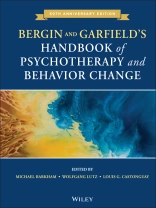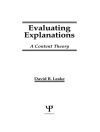Celebrating the 50th anniversary of a best-selling and renowned reference in psychotherapy research and practice.
Now celebrating its 50th anniversary and in its seventh edition,
Bergin and Garfield’s Handbook of Psychotherapy and Behavior Change, maintains its position as the essential reference volume for psychotherapy research. This bestselling reference remains the most important overview of research findings in psychotherapy. It is a rigorous and evidence-based text for academics, researchers, practitioners, and students.
In recognition of the 50th anniversary, this edition contains a Foreword by Allen Bergin while the Handbook covers the following main themes: historical and methodological issues, measuring and evidencing change in efficacy and practice-based research, therapeutic ingredients, therapeutic approaches and formats, increasing precision and scale of delivery, and future directions in the field of psychotherapy research. Chapters have either been completely rewritten and updated or comprise new topics by contributors including:
- Characteristics of effective therapists
- Mindfulness and acceptance-based therapies
- Personalized treatment approaches
- The internet as a medium for treatment delivery
- Models of therapy and how to scale up treatment delivery to address unmet needs
The newest edition of this renowned Handbook offers state-of-the-art updates to the key areas in psychotherapy research and practice today. Over 60 authors, experts in their fields, from over 10 countries have contributed to this anniversary edition, providing in-depth, measured and insightful summaries of the current field.
Содержание
List of Contributors vii
Foreword xii
Preface xiii
Part I History and Methods 1
Chapter 1 Traditions and New Beginnings: Historical and Current Perspectives on Research in Psychotherapy and Behavior Change 3
Wolfgang Lutz, Louis G Castonguay, Michael J Lambert, and Michael Barkham
Chapter 2 Methodological Foundations and Innovations in Quantitative Psychotherapy Research 19
Scott A Baldwin and Simon B Goldberg
Chapter 3 The Conceptualization, Design, and Evaluation of Qualitative Methods in Research on Psychotherapy 51
Heidi M Levitt, John Mc Leod, and William B Stiles
Part II Measuring and Evidencing Change in Efficacy and Practice- Based Research 87
Chapter 4 Measuring, Predicting, and Tracking Change in Psychotherapy 89
Wolfgang Lutz, Kim de Jong, Julian A Rubel, and Jaime Delgadillo
Chapter 5 The Efficacy and Effectiveness of Psychological Therapies 135
Michael Barkham and Michael J Lambert
Chapter 6 Practice- Based Evidence – Findings from Routine Clinical Settings 191
Louis G Castonguay, Michael Barkham, Soo Jeong Youn, and Andrew C Page
Part III Therapeutic Ingredients 223
Chapter 7 Patient, Therapist, and Relational Factors 225
Michael J Constantino, James F Boswell, and Alice E Coyne
Chapter 8 Psychotherapy Process–Outcome Research: Advances in Understanding Causal Connections 263
Paul Crits-Christoph and Mary Beth Connolly Gibbons
Chapter 9 Therapist Effects: History, Methods, Magnitude, and Characteristics of Effective Therapists 297
Bruce E Wampold and Jesse Owen
Chapter 10 Training and Supervision in Psychotherapy: What We Know and Where We Need to Go 327
Sarah Knox and Clara E Hill
Chapter 11 Qualitative Research: Contributions to Psychotherapy Practice, Theory, and Policy 351
John Mc Leod, William B Stiles, and Heidi M Levitt
Part IV Therapeutic Approaches and Formats 385
Chapter 12 Research on Dynamic Therapies 387
Jacques P Barber, J Christopher Muran, Kevin S Mc Carthy, John R Keefe, and Sigal Zilcha-Mano
Chapter 13 Research on Humanistic- Experiential Psychotherapies: Updated Review 421
Robert Elliott, Jeanne Watson, Ladislav Timulak, and Jason Sharbanee
Chapter 14 Cognitive, Behavioral, and Cognitive Behavioral Therapy 469
Michelle G Newman, W Stewart Agras, David A F Haaga, and Robin B Jarrett
Chapter 15 Mindfulness and Acceptance-Based Treatments 507
Evan M Forman, Joanna J Arch, Jonathan B Bricker, Brandon A Gaudiano, Adrienne S Juarascio, Shireen L Rizvi, Zindel V Segal, and Kevin E Vowles
Chapter 16 Systemic and Conjoint Couple and Family Therapies: Recent Advances and Future Promise 539
Myrna L Friedlander, Laurie Heatherington, and Gary M Diamond
Chapter 17 Efficacy of Small Group Treatments: Foundation for Evidence- Based Practice 583
Gary M Burlingame and Bernhard Strauss
Chapter 18 Psychotherapy for Children and Adolescents: From Efficacy to Effectiveness, Scaling, and Personalizing 625
Mei Yi Ng, Jessica L Schleider, Rachel L Horn, and John R Weisz
Part V Increasing Precision and Scale in the Psychological Therapies 671
Chapter 19 Personalized Treatment Approaches 673
Zachary D Cohen, Jaime Delgadillo, and Robert J De Rubeis
Chapter 20 Combining Psychotherapy and Medications: It’s All About the Squids and the Sea Bass (at Least for Nonpsychotic Patients) 705
Steven D Hollon, Paul W Andrews, Matthew C Keller, Daisy R Singla, Marta M Maslej, and Benoit H Mulsant
Chapter 21 Internet Approaches to Psychotherapy: Empirical Findings and Future Directions 739
Gerhard Andersson and Thomas Berger
Chapter 22 Extending the Scalability and Reach of Psychosocial Interventions 763
Alan E Kazdin
Part VI Towards the Future 791
Chapter 23 Epilogue: Prevalent Themes, Predictions, and Recommendations 793
Louis G Castonguay, Catherine F Eubanks, Shigeru Iwakabe, Mariane Krause, Andrew C Page, Sigal Zilcha- Mano, Wolfgang Lutz, and Michael Barkham
Appendix Table of Contents for All Chapters and Editions over the Last 50 Years 803
Author Index 809
Subject Index 823
Об авторе
Michael Barkham, Ph D, is Professor of Clinical Psychology at the University of Sheffield, UK. He has over 35 years of experience researching the processes and outcomes of psychological therapies, focusing on the development of outcome measures, conducting pragmatic trials, and the analyses of large practice-based data sets.
Wolfgang Lutz, Ph D, is Professor of Clinical Psychology and Psychotherapy at the University of Trier, Germany. His research focuses on change in psychotherapy and aims at supporting personalized decision-making based on empirical data. He is a former editor of Psychotherapy Research and president-elect of the Society for Psychotherapy Research.
Louis G. Castonguay, Ph D, is Liberal Arts Professor of Psychology in the Department of Psychology at Penn State University, USA. His research focuses on factors related to the process and impact of psychotherapy. He is also involved in practice-oriented research and practice research networks. He has served as president of the Society for Psychotherapy Research.












